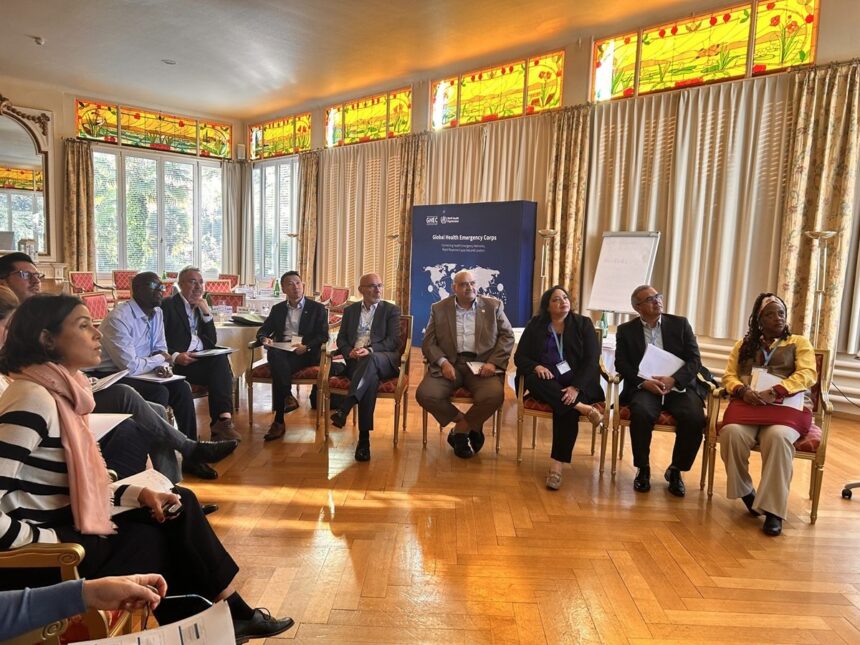“`html
Since its inception in May 2023, the Global Health Emergency Corps (GHEC) has been a collaborative effort among the World Health Organization (WHO), health ministries, and various partners to create a unified and globally integrated health emergency workforce. This initiative aims to enhance countries’ capabilities in managing health emergencies, improve coordination during crisis responses, and ultimately save lives.
To promote widespread engagement with GHEC, WHO is now providing adaptable implementation guidelines suitable for national, regional, and global contexts. From October 30 to November 1, 2024, WHO convened representatives from various countries alongside partners to evaluate the GHEC framework through scenario-based exercises and outline actionable steps for its implementation.
Delegates from Brazil, Mozambique, and Qatar who attended the GHEC design workshop emphasized the significance of this initiative while sharing their anticipated outcomes.
- Evaluating and Enhancing Emergency Workforce Capabilities: The GHEC allows nations to assess their emergency workforce structures effectively. Dr. Soha Al-Bayat from Qatar’s Ministry of Public Health remarked that “for nations with strong health security frameworks like Qatar’s, GHEC confirms our progress while highlighting existing gaps in our workforce. For other regional countries beginning their journey towards building emergency response capacities, this initiative will serve as a vital tool for gaining political support.”
- Facilitating Coordination Among Surge Networks: The GHEC also establishes frameworks for collaboration between nations and partners during emergencies. Effective coordination mechanisms are essential when responding to crises. Dr. Eduardo Samo Gudo Junior of Mozambique’s National Institute of Health recalled how external humanitarian aid overwhelmed Mozambique after it faced one of Africa’s most devastating tropical cyclones in 2019 followed by a cholera outbreak: “Had we had better coordination mechanisms like those provided by GHEC at that time,” he stated, ”we could have minimized delays and resource wastage.”
Echoing these sentiments on improved coordination was Dr. Leonardo Gomes Menezes from Brazil’s Ministry of Health who highlighted the importance of inter-sectoral collaboration during recent floods affecting over 2.3 million individuals in Southern Brazil: “Search-and-rescue teams needed seamless cooperation with medical service providers; such efforts require extensive coordination across sectors,” he explained. “With the systems facilitated by GHEC in place for future emergencies we can enhance our effectiveness significantly.”
- Connecting Leadership in Emergency Health: Through its initiatives under GHEC, leaders within emergency health sectors are interconnected at all levels enabling them to respond collectively against emerging threats effectively. In alignment with this goal WHO is forming a network specifically designed for regional health emergency leaders across Africa and Eastern Mediterranean regions aimed at bolstering responses to complex public health challenges.
The Path Forward: Implementing Global Health Emergency Corps
The recent design workshop served as an essential platform for fostering consensus regarding both the concept behind GHEC as well as practical steps toward its execution within individual countries’ frameworks.
Participants were also introduced to generative artificial intelligence (AI) technologies which could be leveraged not only operationally but also empower nations tailoring principles according specific needs while accelerating innovation dissemination.
The Global Health Emergency Corps equips nations along with their respective regions plus response collaborators comprehensively assess existing structures related directly towards handling public healthcare crises efficiently.
Through this program participants can pinpoint deficiencies or areas needing enhancement ensuring robust coordinated responses not just locally but extending into neighboring territories globally.
In upcoming months WHO alongside several pioneering countries will collaborate closely implementing improvements via simulation exercises further strengthening these corps benefiting all involved parties.
Source.
“`






